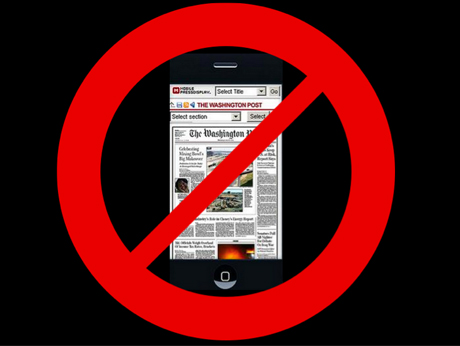
Speaking at the Global Editors Network Summit in Barcelona today, Cory Haik, executive producer and senior editor for digital news at the Washington Post, shared some of the key points behind the outlet's digital strategy.
"We're really hot on this concept called adaptive journalism," said Haik, which she defined as "a really platform-specific approach to storytelling."
This approach enabled the the Post to be "really innovative," she added, and to create content that is designed specifically for the device on which it is being viewed.

An old version of the Washington Post's mobile app, as featured in Cory Haik's presentation.
Showing a screengrab of an old Washington Post app, essentially a newspaper replicated on a mobile screen, Haik described it as "awful" and "the exact opposite" of what the Washington Post now aspires to achieve.
"We think that on mobile there's space to create storytelling that is specifically for mobile," she explained.
"The [Washington Post] newspaper does a fantastic job in the form that it's in, but we aim very specifically to build by device and by platform."
In order to do this, Haik said there were three key points to consider for adaptive storytelling:
Where users are coming from
Users arriving at the same website from search, social or directly, each have significantly different expectations of the kind of content they will be met with, said Haik.
For users clicking through to WashingtonPost.com from Twitter, Facebook or other social networks, Haik explained that the outlet aimed to offer a "social welcome mat" – serving up interesting, socially-integrated conversation.
On the other hand, she noted that users arriving at WashingtonPost.com directly are "probably users that are coming back more frequently, that know our brand".
"We're trying to build out for those different user groups and create custom experiences for them," she added.
Users' live environment
"The internet is in our hands and on our wrists and everywhere now," said Haik, referring to the growing trend for consuming news on mobile and, though less common, smartwatches.
"So people are consuming our information in multiple states."
This change in reader habits, coupled with developments in mobile technology, means news outlets could now offer content to users in context, adapted not only for different times of day but also for the user's location and how much time they have to spare.
"Are they at the airport with three hours to kill on their mobile phone?" asked Haik.
"If so, we know that they can consume a long-form story.
"Or are they on their couch on a Sunday night, on their tablet? That's also a different experience too."
Advanced analytics meant the Washington Post could now determine not only what device a user is accessing the site from, but also whether they are using WiFi or 3G, in order to "build specifically for those different cases".
Later in her presentation, Haik showed a prototype model of a new Washington Post app designed for the Samsung Galaxy Gear smartphone.

A sneak peek of the Washington Post's prototype app for the Samsung Galaxy Gear watch. Image courtesy of Cory Haik/Washington Post
The "gifts" of a device
Differences between platforms, what Haik refers to as "gifts", has allowed the Washington Post to get creative when it comes to developing new types of content, said Haik.
"That means, what can this device do that this machine might not be able to do, that certainly a newspaper could not do?" she elaborated.
The most simple of these "gifts" is the geo-location function of a mobile device, she said, which allows the outlet to tailor content around where a user is at any given time.
However, she added, "as our devices develop there are more opportunities, say, tying into the gyroscope of your phone and building an interactive".
Journalism.co.uk's forthcoming news:rewired conference includes a keynote speech from The Wall Street Journal's mobile editor David Ho.
For tickets and more details visit news:rewired.com.
Free daily newsletter
If you like our news and feature articles, you can sign up to receive our free daily (Mon-Fri) email newsletter (mobile friendly).
Related articles
- Washington Post releases year-in-review feature for subscribers
- From Reuters to The New York Times, Big Oil pays 'most trusted media brands' to push greenwashing
- The Washington Post discovers an engaged gaming audience
- Four digital media trends to watch: generative AI, Gen Z, business models and news formats
- Subscription retention strategies: pain points and remedies









